The world is increasingly affected by global events that project the conflict, and by the local implications that come with it.
Four years ago, COVID-19 spread from East Asia to the rest of the world. With it, hate against the Asian community in B.C. also spread like a virus.
Anti-Asian hate incidents in the City of Vancouver rose by 717 per cent in 2020 compared to the previous year, resulting in the city being called the “Anti-Asian Hate Crime Capital of North America.”
After the attacks of October 7, 2023, committed by terror organization Hamas against Israel, we saw an unprecedented rise in antisemitism, targeting Jewish communities across the province.
In January, the Vancouver Police Department reported that antisemitic hate incidents in 2023 rose by 62 percent compared to the previous year.
Hate impedes a community’s ability to practice its culture, congregate in its communal spaces, and even exist in our cities.
Depending on where you live, law enforcement resources available to address hate from vary significantly.
The data above are from the Vancouver Police Department, in part, because they are the only police force in B.C. with a dedicated hate-crime reporting portal available online in 13 languages, which allows them to produce reliable and comparable yearly statistics. Looking to catch up, the RCMP detachments in North Vancouver and Coquitlam have introduced hate-incident online reporting pilot programs; however, the remaining police detachments in Metro Vancouver and the province have little or no dedicated hate-crime reporting tools.
When wishing to report a hate crime, victims face many barriers. For example, police websites are predominantly available only in English, problematic because many of those who experience hate face language barriers. Also, local community police often have insufficient training and are under-resourced, leaving victims to call sometimes unstaffed non-emergency phone lines, to handle such incidents.
These barriers further traumatize the victims of hate, making them feel even less safe in their communities.
If people don’t feel comfortable coming forward, hate crimes go unreported, and decision-makers don’t have the data to assess the real threats to at-risk communities.
In response to the COVID-related rise in anti-Asian hate, Fix Police Reporting called on “law enforcement agencies to provide accessible reporting systems in multiple languages.”
In her inquiry into hate during the COVID-19 pandemic, B.C. Human Rights Commissioner Kasari Govender called on the B.C. government to “develop, adequately fund and promote a … province-wide centralized reporting system for hate incidents.”
The Centre for Israel and Jewish Affairs similarly advocates for the province to “standardize hate-crime reporting,” and goes further with calls to “mandate annual reporting by every police force.”
While the catalysts for spikes in anti-Asian and antisemitic hate are from different global events, the calls from many advocacy organizations are the same.
The B.C. government has announced the rollout of the long-requested racist incident helpline, and the RCMP have two dedicated staff members as part of a provincewide hate crime unit; however, until there are consistent and comprehensive tools available, those experiencing hate will be forced to navigate a patchwork of resources while dealing with some of the most traumatic incidents of their lives.
Hate cannot be stamped out until its manifestations and impact are understood. The only way to do that is to hear from the community how they are being affected. It’s time for the government to listen to calls from both the Asian and Jewish communities, and develop solutions that make hate-incident reporting accessible.
Hate won’t wait. Neither should our government.
Nico Slobinsky is the vice-president Pacific region for the Centre for Israel and Jewish Affairs. Steven Ngo is a Vancouver-based lawyer who is the founder of Fix Police Reporting, works with the Vietnamese Professionals Association of B.C. and is a recipient of the B.C. Medal of Good Citizenship.



